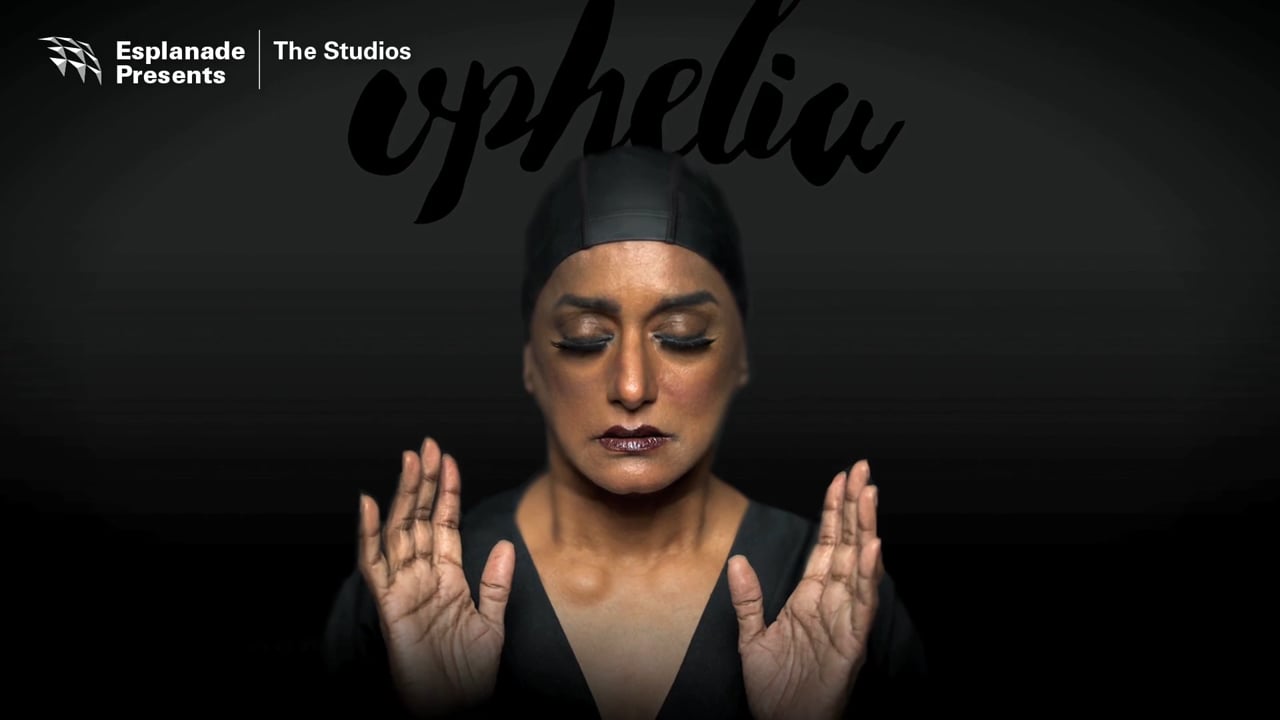
July 22, 2021, by Peter Kirwan
Ophelia (Cake Theatrical Productions) @ Esplanade Theatre Studio
‘My name is Ophelia, and today I will begin by playing Hamlet’. There are many great lines in Natalie Hennedige and Michelle Tan’s Ophelia, performed in English at the Esplanade Theatre Studio in March 2016, but the play is perhaps best summed up in this one, spoken by Jo Kukathas’s Ophelia. This is a deconstruction of Shakespeare’s Hamlet, exploiting the central (and deeply problematic) relationship between Ophelia and Hamlet as a route into exploring misogyny, systemic abuse, and cycles of oppression.
Ophelia’s line goes on to speak more specifically about how she intends to play on Hamlet, but the line reflects the metatheatrical substructure that underpins this two-hour piece. Played predominantly between two actors, Kukatha and Thomas Pang as Hamlet, the play thematises the idea of acting itself. Hamlet is both star and director, and repeatedly tells Ophelia how to play her part, making her re-run lines and actions until someone (he?) is satisfied. Ophelia, for her part, obeys repeatedly, while also talking directly to the audience to trouble her obedience, to speak to the inner life of the woman who is publicly made abject.
The ability of Ophelia to speak out while being controlled is key to the play’s ideas, which bring together a large range of images from both Hamlet and from wider society to enact the push and pull of agency. The theatre itself is a controlling institution. On a set made up to look like a swimming pool without any water, the production plays out the sick joke of casting Hamlet as the lifeguard to the drowning Ophelia, a poignant and infuriating image of paternalistic control, offering the illusion of male-embodied safeguards while actually allowing women to drown – if not often actively being the ones to drown them. And Hamlet asserts his control as an actor in the theatre too, calling for lights and sound, and demonstrating his dominance. Early on, Ophelia asks ‘Could I have some light please? I’m in shadow’. Hamlet responds by calling for ‘light’, at which Ophelia is put in a spotlight, and then by calling for ‘water’, at which Ophelia begins to scream and gag while Hamlet casually sips his coffee.
The treatment of Ophelia within a patriarchal society becomes the condition of all women. This is perhaps made most apparent in a late sequence as Hamlet, sitting upstage in a tall lifeguard’s chair, repeatedly asks an unseen crowd to vote for him. Ophelia repeatedly and deliberately mishears him. ‘A new coat of paint? You want a boat?’, grinding him down until he exasperatedly asks her what she wants. What she wants, she says, is for him to get down from his superior position, acknowledge that she is 7000 times better than him, and to vote for her instead. The play sets up a muscled, showboating Hamlet who insists on the spotlight, while a darkly clad Ophelia (with hair covered under a swimming cap) fights to draw attention from him, regularly succeeding, but never failing to show the extent of the struggle involved in winning that attention. Hamlet goes further, too, in manipulating things to his advantage. He casts the almost entirely non-speaking cleaner/stage manager, regularly revealed sweeping up at the edges of the stage, as Polonius, putting a beard on her and ventriloquising ‘his’ demands of Ophelia, before mocking her for following them. This manipulated figure is another abject woman, the more so for being denied a voice throughout, until her final exit where, in response to a long-awaited apology from Hamlet for taking advantage of her, she wheels and asks him what his apology means.
Hamlet itself becomes a parodied intertext throughout. The stage manager’s mop becomes the Ghost, treated with a reverential awe by Hamlet. Hamlet washes himself down while speaking ‘Oh that this too, too sullied flesh would melt’, directing the stage manager to wash his back while he attempts to keep dignity in his speech. And his soliloquies become a sound check with a microphone that allows him to hear and enjoy his own voice: ‘Oh that this too, too, one two, one two, two be or not be be’. Hamlet is a text that the two actors are in part trying to create, and in part trying to contest. When Ophelia starts speaking ‘To be or not to be’, Hamlet tells her ‘That does not belong to you’, to which an emotional Ophelia slowly and pointedly replies ‘Says who?’
‘Says who’ indeed. Ophelia is a rich play, suffused with symbols and postdramatic play that offers diffuse commentary on the dynamics of Hamlet. An extraordinarily violent scene of abuse is carried out with the actors at a remove from one another, Hamlet beating and kicking thin air while Ophelia wails on the floor. The skull emerges towards the play’s end, held aloft by Ophelia as she speaks a speech of liberation and salvation of the oppressed. A man emerges with a bassoon to accompany one of Hamlet’s reveries; later, Hamlet brings out a Nerf gun to repeatedly shoot at a cowering Ophelia, who nonetheless refuses to yield the space at the centre of the stage that she has claimed. And the play concludes on a moving image as Kukatha – who is rivetting throughout, pleading and insisting on her agency, announces ‘I can’t fight any longer. The miracle is endurance. There is nothing else’ as rain begins to fall, the swimming pool finally receiving the water it has lacked throughout the production. The complexity of the imagery is more dense than this short review can do justice to, but this play’s deconstruction of Hamlet exposes the brutality at its core, and gives a voice to generations of oppressed women.
No comments yet, fill out a comment to be the first

Leave a Reply